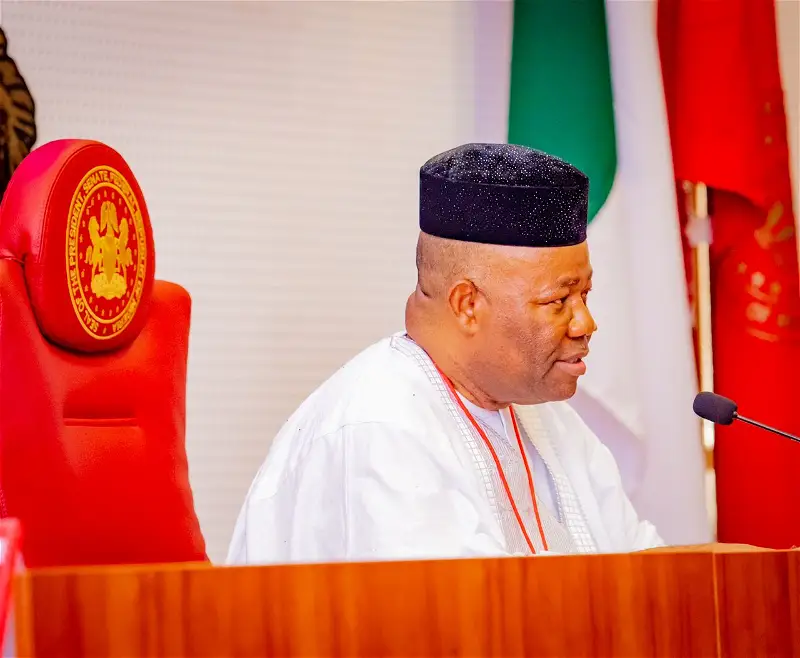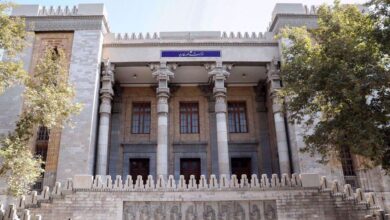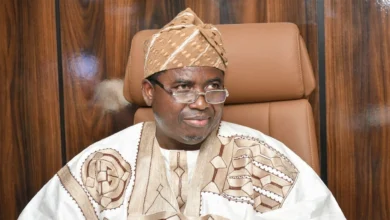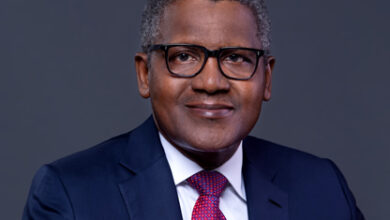The Akpabio-provoked N30b Intifada

By FESTUS ADEDAYO
(Published by the Sunday Tribune, February 25, 2024)
So at plenary in the senate last week, Senate President, Godswill Akpabio, rushed naked out of the bathtub. He raised his hand up. In the presidency’s search for scapegoat, Akpabio suddenly became Archimedes. Last week, he came forward to shout “Eureka!” He had found the No 1 Nigerian enemy! Ancient Greek scholar, Archimedes, was the author of a find similar to but of sterner stuff than Akpabio’s. Archimedes had proclaimed “Eureka! Eureka!” immediately he stepped into a bath and discovered that the water level immediately rose. This led him to the discovery that the volume of water he had displaced equaled the volume of the part of his body he had submerged. This discovery led to what in science is today known as the Archimedes principle. The Greek scholar was said to have been so excited at his discovery that he dashed out of the bathtub and ran naked through the streets of Syracuse. Before him, this knowledge was not known.
Like Archimedes, Akpabio had made a find that would revolutionize the quest for who exactly was behind Nigeria’s food crisis. He said he got this Archimedes find from an “unverified report.” The world slid into eerie silence. Why would the No 3 Citizen of Nigeria regale Nigerians with a report that lacked the rigour of verification? That office, at the occupier’s beck and call, was stacked with panoply of authentic information about happenings in high and low places. So, why would Akpabio seek to transmute an unverified report into national discourse? Wasn’t this akin to giving life to rumours? Nigerians listened nevertheless. And Akpabio spoke. He had found the enemy of Nigeria. They are the 36 state governors. They collected the sum of N30 billion each from the Federal Inland Revenue Service (FIRS) to cushion the effect of biting inflation and high cost of food in their respective states. He thereafter relapsed into the usual inane platitudes that Nigerian leaders are known by. Every state government should utilize the money, he said. The state governments have a lot to do because they are closer to the people and Nigerians want to eat as there is no excuse, bla bla bla…
The logic of Akpabio’s find does not seem to add up. As governor of a Nigerian state for eight years, he must be aware that FIRS cannot pay money directly to sub-national governments. It is a revenue generating agency. It is not a revenue sharing entity. Even then, in its strict configuring, the Nigerian federal government is the proverbial Alabahun or Ahun, otherwise known as Tortoise, the trickster. A fable is told of how Tortoise and his son were at the dining table. As Tortoise, the father, scooped up a morsel en-route his mouth, his son opened his mouth, hoping the father had meant it for his belly. Tortoise felt sorry for his hungry son and told him that if he was that generous, the world would not ascribe the appellation of ahun (the stingy) to him.
As designed by the RMAFC and approved by the National Assembly, the Federal Government takes 52.68% of federally distributable revenue and states, 26.72%. The FG is very wealthy. Akpabio must however be aware that, as huge and wealthy as it may be in public eye, the federal government cannot give out freebies to any state, except their statutory entitlements. So, did Akpabio not know this or did he damn all he knew for the sake of an ulterior motive? Or was it the usual lack of depth in high places that was unraveling?
If one of the governors, Seyi Makinde of Oyo State, had not bravely spoken out almost immediately last week, the consequences of the deflection of arrows parceled out for Nigerian governors would have been dire. Makinde’s counterpart in Akwa-Ibom, Umo Bassey Eno, also did same. Eno was even blunt and direct: “We are in a time when people want to be relevant and they feel that being relevant is to incite the public, tell lies against government. No civil society behaves like that.” He said this in denying Akpabio’s conjured N30b. Already, a welter of attacks against the governors had sprung up on the social media. If the Akpabio allegation had gone without a lie put to it, we would have had passers-by pelting governors’ vehicles with stones and a state of uprising in the states. Akpabio would have feathered his political nest in the presidency as a good Man Friday.
At critical moments, virtues leaders need to exhibit are self-restraint and forbearance. The mouth, as harmless as it may seem, is a very powerful weapon that leaders must use sparingly. It holds emotions and feelings and is also a tinder which can cause national fire. The moment the mouth is set a-loose, its destructive effect is unimaginable. In the Ifa corpus, Esu, being the most gluttonous of the Irunmoles (deities) reputed with the task of ferrying human appeasements from earth to heaven, is most times depicted with his lose mouth. A story of the destructive nature of the mouth and unconscionable decision is often told in King Odarawu. He was an Alaafin in the old Oyo Empire whose brief reign in the late seventeenth century, after succeeding Alaafin Ajagbo, his father, made him the first Alaafin to be rejected by the Oyomesi, the council of state. Odarawu was a prisoner of his tongue and temper and this led to the brevity of his reign. His fiery temper and the calamity it wrought became almost like a totem which the kingdom used to teach morals about leaders and their mouths.
Told by The Reverend Samuel Johnson in his authoritative Yoruba nation biography, The history of the Yorubas, (p 169) as was the custom, at his installation, Odarawu was asked to name his enemy. Without mincing words, the Prince named Ojo Segi, a town in the kingdom. On what provoked the enmity, Odarawu went down memory lane. Years back, the Prince had gone to buy corn meal (eko) for dinner. Unbeknown to him, the woman who sold the eko was the Baale’s wife. The price of a wrap of eko was then a cowry and Odarawu bought six. He however paid five cowries, according to the privilege of his birth. The Baale’s wife, feeling insulted and not aware of his princely status, decked Odarawu’s face with a dirty slap. She then repeatedly shouted “thief!” at him for trying to withhold a cowry off her legitimate earning. As he was being installed Alaafin, Odarawu asked the council for one favour: the destruction of Ojo Segi. Though the Oyomesi acceded to his request and brought the town to ruins, the council agreed to do away with Odarawu. In their estimation, the new king was a heartless tyrant. If, out of malice against a single woman, he could have macabre pleasure in the destruction of a hapless people, he was not worthy of the kingdom. Oyo people thereafter rejected Odarawu and, in frustration, he committed suicide.
Nigeria’s Senate President, Godswill Akpabio, took on a very minute slice of the vice that brought Odarawu and the people of Ojo Segi to destruction. Akpabio unleashed the power of the tinder in his mouth. Today, Nigeria is embroiled in crises. Her economy is tailspinning into chaos. A video of Thomas Hobbes on Kaduna road, Suleja went viral a couple of days ago. Protesters against the badly hit economy went haywire, showcasing Nigerian life at this time as nasty, brutish and short. A Dangote truck was also said to have earlier been hijacked somewhere in the north and its food content pillaged. From every indication, there is a national emergency and leaders’ cast role at this time should be forbearance and words that will fuse the people together.
Rather, buck-passing and scape-goating have reigned. Yet, hunger has morphed into anger on the streets. Apart from seeking ways out of their hunger, Nigerians want to know who their enemy, the one responsible for this hunger, is. Spiritedly, Bola Tinubu, president of Nigeria, has seized every opportunity to tell the people he is their friend. Like an evangelist, Tinubu has been gospelling. His have been preachments of patience and policies (PPP). But, like the biblical sower, Tinubu’s seeds are not landing on the ridges where they should germinate. They fall on furrows and waysides where sparrows fly down from the sky and immediately swallow them for dinner.
You cannot blame the people. Hunger has stretched their patience thread-thin. It is tearing asunder political party loyalties and primordial sentiments. Even All Progressives Congress (APC) party members are throwing barbs at their party-led government. Yoruba are forcefully retrieving the chain of beads they cavalierly decorated on the amoeba-shaped bottom – the “Idi bebere” – of their child in the wake of the 2023 presidential election. Hunger is angrily making the people break the beads into pieces. Whilst gallant praise-singing soldiers recruited on social media to deodorize the hunger in the land attack them for being bastards, Yoruba listen to the jarring noise of hunger in their bellies. Didn’t our forefathers say that when hunger ingresses into the belly, every other matter egresses? Recently, the people’s hunger pushed them to the streets of Ibadan, Oyo State to protest. Shouting “Enough is enough” to the “Idi bebere” reign of hunger, they demanded what use the Tinubu PPP would be to them by the time hunger had sent them to their untimely graves.
In the midst of all this, explanations for the hunger in the land are finding their way into the information highway. A pot-pourri of explanations confronts the people. The soldiers are struggling to outdo one another in this roulette of convincing hungry Nigerians that they are not too hungry. Yet, Nigerians want to know who their real enemy, the one responsible for this massive hunger, is. According to the soldiers on the social media, the Number One cause of the hunger is the ramrod-thin General, the one who spoke seldom while his mindless appointees stole Nigeria blind; whose eight-year reign was filled with empty sanctimony – Muhammadu Buhari. Cascading the enemies downwards, they equally told us that thin-statured ex-CBN governor, Godwin Emefiele, ranks high on the list of those responsible for this massive hunger. The history of the hunger was further elasticized. According to them, Nigeria’s financial troubles began from the crisis that stampeded Sanusi Lamido Sanusi out of the vault of the CBN. A report of huge financial mess in the Nigeria’s apex bank, they said, had allegedly indicted Lamido. But, so they reasoned, Sanusi ran out of the cold harmattan haze of the hefty allegations into the humid comfort of the Kano Emir’s palace. The palace immediately provided him a shawl for his face, immunity from a Goodluck Jonathan whose roars were as feeble as a cat’s meow. So, to Sanusi we should look for the genesis of our hunger.
The presidency was even more direct. A ubiquitous, even if nameless, opposition must be the culprit. The saboteurs, in the narrative of the president, were those who failed in their bid to clinch power in the last election. They have subsequently remained in “political mode” while working towards the fall of the country. Speaking last Tuesday in Abuja at the inaugural Public Wealth Management Conference organised by the Ministry of Finance Incorporated, the president, represented by Vice President Kashim Shettima, added another scapegoat – smugglers. He said government had uncovered fresh 32 smuggling routes through which food items were siphoned out of Nigeria.
Those feeble explanations have yet to tame the anger on the streets. With attacks on the Tinubu government growing by the day, methinks a Strategic Hunger Council Meeting (SHCM) became imperative. And it was inaugurated. The spirit of Joseph Goebbels, German philologist and Nazi politician, was immediately invoked. How could government deflect these raging arrows? Being same party-led government, there is a tolerable level to which this government could shovel the dirt of current woes on the Buhari government without a boomerang. In any case, the president himself had asked Nigerians not to pity him as he willingly asked to be president. He knew Nigerians would ask if he wasn’t aware of the challenges of governing a chaotic Nigeria before diving into the waters. Swimmers, flaunting their prowess, scold the ogberi (non-initiates) not to even step their foot on the bank of the river if they cannot swim as the Oluweri – goddess of the river – was prepared to make barbecue of them.
So, the SHCM must have agreed that the most effective scapegoats should be the Nigerian governors. Don’t our elders say, being a generally perceived abominable bird, any arrow shot at the vulture is well deserved? (Iri t’a ri’gun la fi nta’gun l’ofa) The Villa goons have empirical and believable reasons to turn their gaslighting state-wards. Since the advent of the 4th Republic, massive theft of Nigeria’s resources has taken place in the states. Governors after governors have pillaged their states’ resources mindlessly, leaving shells as memorabilia. Since 1999, the Economic and Financial Crimes Commission, (EFCC) established to go after the vultures scavenging our vaults, has tumbled from a fearsome lion to a tame cat. Today, rather than governors and other thieves in high places, EFCC’s special menu is scamming boys in university hostels.
The narrative of blame must thus land at the feet of the governors. It began with the social media soldiers calling Nigerians’ attention to increasing FAAC allocations from the casino tables of Aso Rock which they said have swelled state governments’ accounts. With this, they say there is no reason why blames for Nigerians’ pervasive hunger should be pointed in Aso Rock’s direction. The Tinubu government’s fiscal reforms, they also argue, have benefited state governors’ coffers tremendously. It is an argument flushed down general lavatories which has saturated national sewages. Only a deeper thought can defrost the argument of its cants and sophistry. True as it is that many governors go on a binge with their monthly allocations, what was the worth of the state allocations before now and today, with the Tinubu chaotic economy? How much is the worth of those allocations today as Tinubu’s Naira engages in Atilogwu dance? For those who inherited foreign debts from their predecessors among the governors, what is the worth today of those debts which they pay from their federal allocations? Do states pay the same salaries now as before the reforms?
In my thinking, in pursuit of this general scape-goating agenda, a willing recruit needed to be found. No one fitted the bill than Godswill Akpabio. He wears on his lapel the unenviable pedigree of a reversible chameleon. Even before his recent Odarawu journey, like Nostradamus, Thisday’s Segun Adeniyi had appropriately dimensioned him. In his last week’s piece entitled Akpabio: A man for every new season, which is a summary of the reversible political life of the former Akwa Ibom state governor, Adeniyi fittingly attired the Senate president the garment of sanctimony. In the piece, he effectively derobed him of any flavor of virtues of leadership. In its place, Adeniyi wore on Akpabio a befitting garment of an all-weather politician who follows the tide of power and office.
The truth is, characters like Akpabio get away with their insurrectionist statements because the people move on after each Intifada. Since the N30b Intifada, Akpabio has gone into his shells; no remorse, no apologies to the over N200 million Nigerians whose emotions he provoked needlessly by such gross lie. In saner societies, such a leader would be sorry; or, be made to be sorry.









